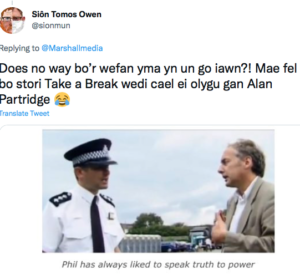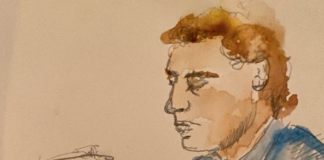- Dark speak easy part one - 18th February 2026
- X marks the spot again - 17th February 2026
- Wordy again part three - 16th February 2026

During 23 years with the BBC, and 40 years in journalism (when he was trained to use simple language, avoiding jargon), reporting the truth has always been central for our Editor, Welshman Phil Parry, but he’s suffered enormous abuse because of it, and now he fears that the growth of Artificial Intelligence (AI) could actually see the levels INCREASE.
Earlier Phil has described how he was helped to break into the South Wales Echo office car when he was a cub reporter, recalled his early career as a journalist, the importance of experience in the job, and making clear that the‘calls’ to emergency services as well as court cases are central to any media operation.
 He has also explored how poorly paid most journalism is when trainee reporters had to live in squalid flats, the vital role of expenses, and about one of his most important stories on the now-scrapped 53 year-old BBC Wales TV Current Affairs series, Week In Week Out (WIWO), which won an award even after it was axed, long after his career really took off.
He has also explored how poorly paid most journalism is when trainee reporters had to live in squalid flats, the vital role of expenses, and about one of his most important stories on the now-scrapped 53 year-old BBC Wales TV Current Affairs series, Week In Week Out (WIWO), which won an award even after it was axed, long after his career really took off.
Phil has explained too how crucial it is actually to speak to people, the virtue of speed as well as accuracy, why knowledge of history and teaching the subject is vital, how certain material was removed from TV Current Affairs programmes when secret cameras had to be used, and some of those he has interviewed.
He has disclosed as well why investigative journalism is needed now more than ever although others have different opinions, how the coronavirus (Covid-19) lockdown played havoc with media schedules, and the importance of the hugely lower average age of some political leaders compared with when he started reporting.

The growth of new technology, and now Artificial Intelligence (AI) has provided fantastic opportunities, but sadly it has also offered new ways to insult journalists like me, who try to tell the truth about people which might be unwelcome to some.
I have a great fear that the abuse I have suffered in the past on social media may actually increase with AI, and bots like ChatGPT.
Perhaps automatically generated insults will be hurled regularly at me. The insults I endure now are bad enough, but they could pale into insignificance in the future!

Possibly the worst I have had to put up with is when one critic, called Marc Winchester wrote on what is now ‘X’ (in an apparent joke): “I’ll whack him (me)“.
Despite the supposed humour in this remark it was still reported to the police which mounted an investigation.
The closest after this level of abuse were the comments I received from the disgraced Welsh lobbyist Daran Hill, who is now in jail for possessing paedophile images.
In the past he has used social media to call me “bitter”, and a “misogynist” (misspelt), forcing me to take legal action after which a fulsome apology was forthcoming.


My Wikipedia entry has also been vandalised to include the words ‘tool’ as well as ‘knob head’, and I have been compared to the comedy broadcaster Alan Partridge.
The Wikepedia entry has now been restored to its original form, after officials removed the abusive words.
The Alan Partridge comment was by a Sion Tomos Owen whose blog describes him as: “…a bilingual TV and Radio presenter, illustrator, writer and creative workshop tutor…”.

Mr Owen said in Welsh: “There’s no way that this website (The Eye) is for real?! It’s as if a Take a Break (light magazine) story has been edited by Alan Partridge” (laughing emoji).
It appears that language is important to Mr Owen, because recently in a ‘story’ about free tickets to the Eisteddfod (which next year is due to be in Pontypridd potentially boosting the Welsh language), he featured prominently.
He said: “I think the Welsh language is still viewed a little bit an other in RCT (Rhondda Cynon Taf). It was a hotspot once and then because of mining areas it’s a bit less now”.

Another remark which tried to target me concerned a television ‘reporter’ who had posted pictures of herself on social media in skimpy clothes, and is sadly typical of the insults constantly received online by The Eye or by me personally: “Your article on Ellie Pitt was bordering on mysogynistic bullying, a really pathetic article written by a bitter individual who was a complete failiure as a BBC correspondent and also loved bashing the Catholic Church with your disgraceful Panorama programme”.
In the past I have, too, been accused (incorrectly) of being a “bastard” (many times), an “anti-devolutionist wanker”, “pure scum”, a “liar” (also many times) a “little git”, and (correctly) a “nosey git”, “irritating”, or a “nuisance”.
But these remarks come amid many others. Too many, in fact, to mention. Legal action is rarely taken (although sometimes it is, as shown after Hill’s public comment) unless the online message is particularly outrageous, and contains a libel (which most of them do).

Some can be rebutted in court using an “honest comment” defence (formerly known as “fair comment”), however most cannot, which means that any libel case is likely to be successful.
But it is not just people like me who should be worried.
Elections are due next year in America, UK, India, Indonesia as well as Taiwan, and there are major concerns that AI may spread disinformation.


What could large-language models like AI change in 2024? One thing is the quantity of disinformation: if the volume of nonsense were multiplied by 1,000 or 100,000, it might persuade people to vote differently.
A second centres on quality – hyper-realistic deepfakes could sway voters before false audio, photos and videos could be debunked.
A third is microtargeting – with AI, voters may be inundated with highly personalised propaganda at scale, and networks of propaganda bots could be made harder to detect than existing disinformation efforts are.

Voters’ trust in their fellow citizens, which in America has been declining for decades, may well suffer as people begin to doubt everything.
Unfortunately I have been subjected to far worse than mere doubt online – and AI may only make that abuse worse in future…
Details of Phil’s astonishing decades-long journalistic career (when insults because of his stories were mercifully rare at the beginning), as he was gripped by the incurable neurological condition Hereditary Spastic Paraplegia (HSP), have been released in an important book ‘A GOOD STORY’. Order it now.

Regrettably publication of another book, however, was refused, because it was to have included names.
Tomorrow – he examines the recent extraordinary by-election result in Scotland, along with the incredible reversals of political fortune that have happened in the past.









